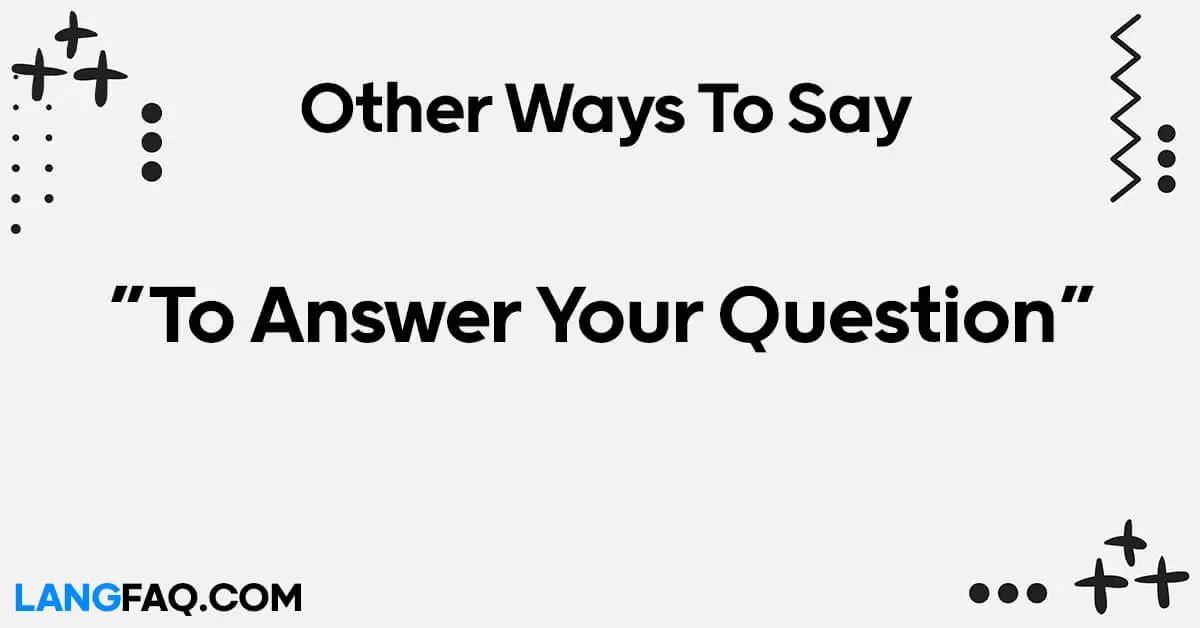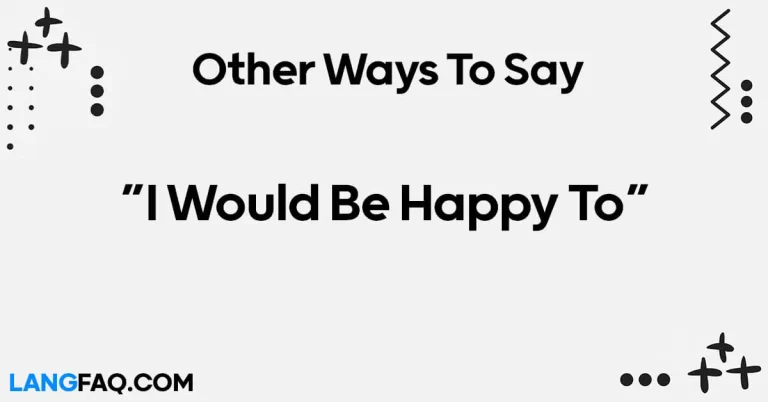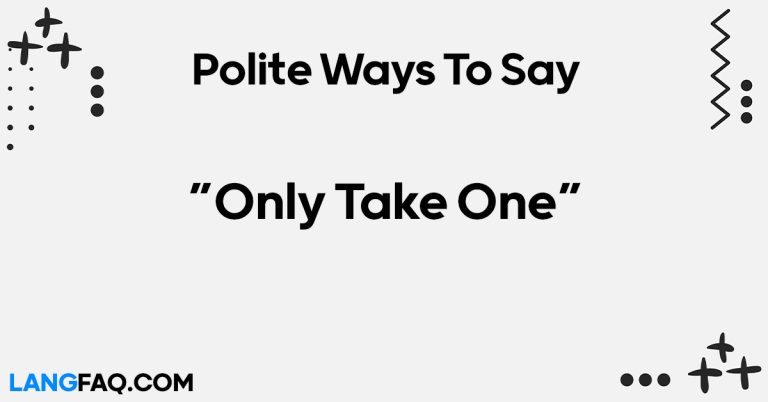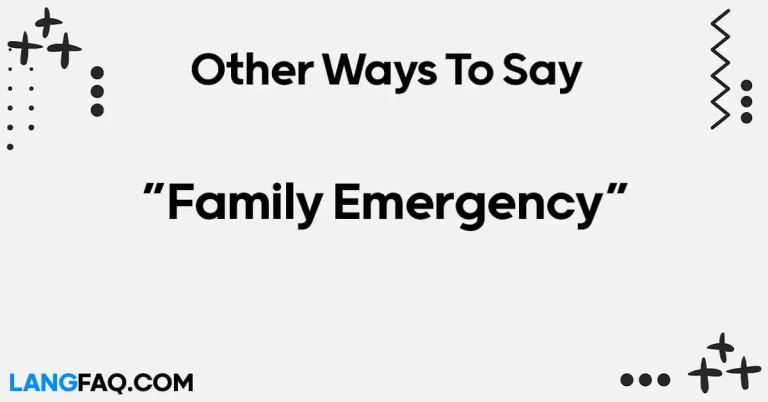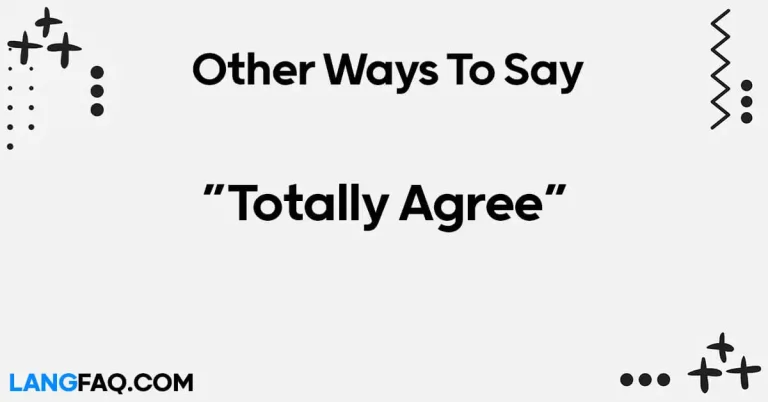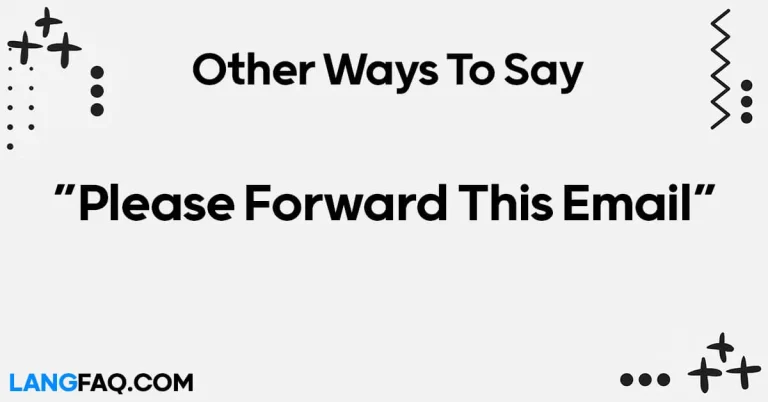In the vast landscape of language, the ability to respond effectively is paramount. “To answer your question” may sound straightforward, but there’s an array of expressions that can add depth and nuance to your replies. Let’s delve into 12 different ways to elevate your responses and make your interactions more engaging.
12 Other Ways to Say “To Answer Your Question”
Here are 12 alternative ways to say “To Answer Your Question”:
- In response to your inquiry
- Regarding your question
- Let me address your query
- Per your request
- Allow me to clarify
- I appreciate your question
- Thank you for asking
- Sure thing!
- You bet!
- Certainly!
- Absolutely
- Indeed
| Expression | Meaning | Examples |
|---|---|---|
| In response to your inquiry | Providing an answer to your question | “In response to your inquiry, the answer is yes.” |
| Regarding your question | About your inquiry | “Regarding your question, here is the information.” |
| Let me address your query | Directly handling your question | “Let me address your query about the project.” |
| Per your request | According to your inquiry | “Per your request, the document is attached.” |
| Allow me to clarify | Offering a clearer explanation | “Allow me to clarify any confusion you may have.” |
| I appreciate your question | Expressing gratitude for the inquiry | “I appreciate your question; it’s a thoughtful one.” |
| Thank you for asking | Acknowledging the inquiry with gratitude | “Thank you for asking; I’ll provide the details.” |
| Sure thing! | Affirmative response, indicating agreement | “Can you help me? Sure thing! What do you need?” |
| You bet! | Informal affirmation, expressing certainty | “Will it be done on time? You bet! No worries.” |
| Certainly! | Confident agreement | “Can you assist? Certainly! I’m here to help.” |
| Absolutely | Emphatic agreement | “Absolutely, your suggestion makes perfect sense.” |
| Indeed | Confirming the truth of a statement | “Is it accurate? Indeed, the data is correct.” |
Diversifying your responses with these alternative expressions not only adds richness to your language but also allows you to tailor your replies to various contexts. Whether you’re in a formal business setting or a casual conversation, choosing the right phrase can enhance your communication skills and make your interactions more engaging.
Is It Correct to Say “To Answer Your Question”?
Yes, “To answer your question” is a grammatically correct and commonly used phrase in English. It is a polite and straightforward way to signal that you are about to provide a response or address a query. This expression is often employed in various communication settings, including formal written correspondence, business meetings, interviews, and casual conversations.
The structure of the phrase is grammatically sound, with “to” serving as an infinitive marker, “answer” as the verb, and “your question” as the direct object. The entire phrase functions as an introductory clause, setting the stage for the forthcoming response.
Example Sentence: “To answer your question, the deadline for project submissions is next Friday.”
In this example, the phrase is used to smoothly transition into providing information in response to a question. It’s a courteous and effective way to guide the listener or reader’s attention to the forthcoming answer.
Professional Mail Example With “To Answer Your Question”
Subject: Clarification on Project Timeline
Dear [Recipient’s Name],
I hope this email finds you well. Thank you for reaching out, and I appreciate your diligence in seeking clarification on the project timeline. To answer your question, I would like to provide you with a detailed overview to ensure clarity and alignment.
As of the current status, the project is progressing according to schedule. Key milestones have been achieved, and our team is working diligently to meet the established deadlines. However, I understand the importance of transparency in project management, and I am more than happy to address any specific concerns or provide additional information you may require.
To give you a comprehensive understanding, I have attached a project timeline document that outlines the major phases, deliverables, and milestones. This should offer a clear perspective on the progress made and the upcoming steps in our project plan.
If you have any further questions or if there are specific aspects you would like more details on, please feel free to let me know. I am here to ensure that you have the information needed to make informed decisions and contribute effectively to the project’s success.
Thank you once again for your proactive approach to project communication. I look forward to any additional queries you may have and to our continued collaboration.
Best regards,
[Your Full Name] [Your Position] [Your Company] [Contact Information]
In Response to Your Inquiry
Answering questions requires finesse, and “In response to your inquiry” is a phrase that adds a touch of formality and professionalism to your replies. It’s perfect for formal settings, such as business emails or professional correspondence.
Scenario: Imagine receiving an email from a colleague seeking information on a project. Instead of a simple “Yes” or “No,” you can elevate your response with “In response to your inquiry, the project is on track, and I’ll provide a detailed update in our meeting tomorrow.”
Variations:
- Colleague: “Regarding your question about the upcoming presentation…”
- Mentor-Mentee: “Per your request for guidance on project management…”
Example Sentence: “In response to your inquiry, the team is diligently working on meeting the project deadline.”
Email Sample:
Subject: Response to Your Recent Inquiry
Dear [Colleague’s Name],
In response to your inquiry about the project status, I’m pleased to inform you that we are making significant progress. I appreciate your interest and will provide a more comprehensive update during our meeting tomorrow.
Best regards, [Your Name]
Regarding Your Question
“Regarding your question” is a versatile phrase suitable for various contexts. It maintains a professional tone while addressing inquiries and is particularly effective in written communication.
Scenario: Picture yourself responding to a client’s email seeking clarification on a particular service. Instead of a straightforward reply, you can say, “Regarding your question about our services, I’d be delighted to provide you with a detailed breakdown of our offerings.”
Variations:
- Friend: “Hey, regarding your question about the weekend plans…”
- Professional: “Regarding your question on the budget allocation for the project…”
Example Sentence: “Regarding your question, our team is actively working on implementing the suggested improvements.”
Email Sample:
Subject: Regarding Your Inquiry
Dear [Client’s Name],
Regarding your question about our services, thank you for reaching out. I’m happy to provide you with a comprehensive overview of how our offerings can benefit your business. Please find the details below.
[Detailed Service Information]
I hope this addresses your inquiry. Feel free to contact me for any further clarification.
Best regards, [Your Name]
Let Me Address Your Query
When addressing a question directly, “Let me address your query” is a sophisticated way to convey attentiveness and a commitment to providing a comprehensive response. It’s suitable for both formal and semi-formal contexts.
Scenario: Imagine responding to a team member’s query about a complex project aspect. Instead of a brief reply, you can say, “Let me address your query regarding the project timeline and potential challenges we might face.”
Variations:
- Manager: “Let me address your query about the recent policy changes…”
- Informal Setting: “Hey, let me address your query about the dinner plans for tonight…”
Example Sentence: “Let me address your query about the upcoming client meeting. I’ve outlined the agenda and key points for our discussion.”
Email Sample:
Subject: Addressing Your Query
Dear [Team Member’s Name],
Let me address your query about the project timeline and potential challenges. I appreciate your thorough review and am here to provide clarity.
[Detailed Project Timeline and Challenges]
I hope this answers your query. Should you have further questions, feel free to reach out.
Best regards, [Your Name]
Per Your Request
The phrase “Per your request” exudes professionalism and is ideal for acknowledging specific requests or instructions. It conveys a sense of dedication and responsiveness in various professional settings.
Scenario: Consider responding to a supervisor’s request for a detailed report on a recent project. Instead of a standard acknowledgment, you can say, “Per your request, I have compiled a comprehensive report highlighting key milestones and challenges faced during the project.”
Variations:
- Colleague: “Per your request for feedback on the team’s performance…”
- Mentor-Mentee: “Per your request for guidance on career development…”
Example Sentence: “Per your request, I’ve gathered the necessary data for the upcoming presentation.”
Email Sample:
Subject: Per Your Request – Comprehensive Project Report
Dear [Supervisor’s Name],
Per your request, I have compiled a comprehensive report on the recent project, providing insights into key milestones and challenges faced. Please find the attached document for your review.
[Attached Project Report]
I trust this meets your expectations. Feel free to reach out for any additional information.
Best regards, [Your Name]
Allow Me to Clarify
When a situation calls for a clearer explanation, “Allow me to clarify” is a powerful phrase that demonstrates your commitment to ensuring understanding. It’s versatile and can be used in both formal and informal settings.
Scenario: Picture responding to a client who has raised concerns about a product feature. Instead of a generic response, you can say, “Allow me to clarify the functionality you’re referring to and address any misunderstandings.”
Variations:
- Friend: “Allow me to clarify the plans for the weekend…”
- Professional Setting: “Allow me to clarify the new policy changes for all team members…”
Example Sentence: “Allow me to clarify the process for submitting project proposals to avoid any potential confusion.”
Email Sample:
Subject: Clarification on Recent Inquiries
Dear [Client’s Name],
Allow me to clarify the functionality you mentioned in your recent inquiry. I appreciate your attention to detail and want to ensure you have a clear understanding. Let me break it down for you.
[Detailed Clarification]
I hope this provides the clarity you were seeking. If you have further questions, please don’t hesitate to ask.
Best regards, [Your Name]
I Appreciate Your Question
Expressing gratitude in professional communication is crucial, and “I appreciate your question” adds a touch of courtesy to your responses. It’s suitable for acknowledging inquiries in various settings.
Scenario: Imagine responding to a team member who has raised a thoughtful question during a meeting. Instead of a straightforward answer, you can say, “I appreciate your question, and it brings attention to a critical aspect of our project that we should explore further.”
Variations:
- Colleague: “I appreciate your question about the upcoming strategy session…”
- Mentor-Mentee: “I appreciate your question on navigating challenges in the workplace…”
Example Sentence: “I appreciate your question regarding the budget allocation for the next quarter. It’s an important aspect that requires careful consideration.”
Email Sample:
Subject: Appreciation for Your Thoughtful Question
Dear [Team Member’s Name],
I appreciate your question during our recent meeting. It highlights a crucial aspect of our project that deserves further exploration. Your engagement is invaluable to the success of our initiatives.
[Additional Insights]
Thank you for your active participation. If you have more questions or suggestions, feel free to share.
Best regards, [Your Name]
Thank You for Asking
The phrase “Thank you for asking” is a gracious way to acknowledge someone’s inquiry, making them feel valued. It’s versatile and works well in both formal and informal situations.
Scenario: Imagine responding to a colleague who has asked about your availability for a collaborative project. Instead of a plain response, you can say, “Thank you for asking about my availability. I’m eager to contribute to the project and will ensure to align my schedule accordingly.”
Variations:
- Friend: “Hey, thank you for asking about my plans for the weekend…”
- Professional Setting: “Thank you for asking about my opinion on the new marketing strategy…”
Example Sentence: “Thank you for asking about the project’s progress. Your interest motivates the team to deliver exceptional results.”
Email Sample:
Subject: Appreciation for Your Inquiry
Dear [Colleague’s Name],
Thank you for asking about my availability for the upcoming project collaboration. I appreciate your consideration and am enthusiastic about contributing to its success. Here are my proposed time slots for a discussion to further align our schedules.
[Proposed Time Slots]
Looking forward to our collaboration. Feel free to reach out for any additional information.
Best regards, [Your Name]
Sure Thing!
When an affirmative and enthusiastic response is needed, “Sure thing!” is the go-to phrase. It adds a touch of positivity and approachability to your communication.
Scenario: Picture a friend asking for assistance with a task. Instead of a simple “yes,” you can respond with, “Sure thing! I’d be happy to help. What do you need?”
Variations:
- Colleague: “Sure thing! I can review your presentation before the meeting…”
- Mentor-Mentee: “Sure thing! Let’s schedule a mentoring session next week…”
Example Sentence: “Sure thing! I’ll take care of the logistics for the upcoming event. You can count on me.”
Email Sample:
Subject: Confirmation – Sure Thing!
Dear [Friend’s Name],
Sure thing! I’d be delighted to assist with your request. Let’s coordinate the details to ensure a smooth process. Feel free to share more specifics.
Looking forward to working together, [Your Name]
You Bet!
For a more informal and friendly affirmation, “You bet!” is a colloquial phrase that adds a touch of warmth to your responses.
Scenario: Imagine a friend asking if you’d like to join them for a spontaneous outing. Instead of a plain “yes,” you can say, “You bet! I’m up for some fun. Let’s make it happen!”
Variations:
- Colleague: “You bet! I’m on board with your proposal for the team-building activity…”
- Mentor-Mentee: “You bet! I’m excited to support your career development…”
Example Sentence: “You bet! I’ll be there for the brainstorming session. It sounds like an exciting opportunity.”
Email Sample:
Subject: Count Me In – You Bet!
Dear [Friend’s Name],
You bet! I’m up for the spontaneous outing. Let’s make it happen and create some memorable moments. Count me in!
Looking forward to it, [Your Name]
Certainly!
When you want to express confidence and agreement, “Certainly!” is a versatile phrase that fits well in both formal and informal settings. It exudes positivity and assurance in your responses.
Scenario: Imagine a colleague seeking confirmation on your availability for a team meeting. Instead of a straightforward “yes,” you can say, “Certainly! I’ll be there and look forward to discussing our upcoming projects.”
Variations:
- Friend: “Certainly! I’m up for a movie night this weekend…”
- Professional Setting: “Certainly! I can accommodate your request for an earlier deadline…”
Example Sentence: “Certainly! Your proposal aligns with our objectives, and I’m excited to collaborate on its implementation.”
Email Sample:
Subject: Confirmation – Certainly!
Dear [Colleague’s Name],
Certainly! I will be available for the team meeting. Looking forward to discussing our upcoming projects and ensuring their success.
If there are specific topics you’d like to cover, please let me know in advance.
Best regards, [Your Name]
Absolutely
For a more emphatic agreement, “Absolutely” is a powerful phrase that adds a touch of certainty to your responses. It works well in formal and informal conversations, showcasing your unwavering support or affirmation.
Scenario: Picture a team member proposing a solution to a complex problem. Instead of a standard agreement, you can respond with, “Absolutely! Your insights are valuable, and I believe this approach will lead to success.”
Variations:
- Colleague: “Absolutely! I agree with your analysis of the market trends…”
- Mentor-Mentee: “Absolutely! Your dedication to learning is commendable…”
Example Sentence: “Absolutely! Your input on the new project strategy aligns perfectly with our goals.”
Email Sample:
Subject: Full Agreement – Absolutely!
Dear [Team Member’s Name],
Absolutely! I fully support your proposed solution to the challenge we’re facing. Your insights are invaluable, and I’m confident this approach will lead to success.
Let’s discuss further in our upcoming meeting.
Best regards, [Your Name]
Indeed
For a more formal and confirmatory response, “Indeed” is a phrase that conveys agreement or affirmation. It’s suitable for professional contexts where a succinct and sophisticated reply is required.
Scenario: Imagine responding to a client’s email expressing satisfaction with your services. Instead of a generic reply, you can say, “Indeed, we appreciate your positive feedback and are committed to maintaining the high standards you expect from our company.”
Variations:
- Colleague: “Indeed, your proposal for streamlining the workflow is noteworthy…”
- Mentor-Mentee: “Indeed, your dedication to continuous improvement is admirable…”
Example Sentence: “Indeed, your suggestion for optimizing our processes aligns with our goals for efficiency.”
Email Sample:
Subject: Acknowledgment – Indeed
Dear [Client’s Name],
Indeed, we are thrilled to hear about your satisfaction with our services. Your positive feedback motivates us to continuously deliver excellence.
If there’s anything specific you’d like to discuss or improve, please feel free to let us know.
Best regards, [Your Name]
FAQs
Q: Can I use these phrases in formal business emails? Absolutely! Professional responses are crucial in business communication, and these phrases add a touch of sophistication to your emails.
Q: How do I handle difficult questions without sounding evasive? Address the complexity directly. Acknowledge the challenge and then provide a thoughtful response to demonstrate your competence.
Q: Are humorous responses suitable for all situations? While humor can enhance communication, it’s essential to gauge the context. In formal settings, use it sparingly and ensure it aligns with the tone of the conversation.
Q: Should I use cultural sensitivity phrases in everyday conversations? Yes, being aware of cultural nuances is valuable in all interactions. These phrases help navigate diverse perspectives and promote inclusivity.
Q: Can I mix and match these phrases in a single conversation? Absolutely! Combining different phrases adds variety to your responses, making your communication more dynamic and engaging.
Q: Is it necessary to use formal phrases in professional settings? Formality is generally appreciated in professional environments. It conveys respect and a sense of seriousness in business interactions.
Conclusion
In the realm of answering questions, variety is the spice of conversation. Experiment with these 12 alternative phrases to elevate your communication skills. Remember, the way you respond can leave a lasting impression, so why settle for the ordinary when you can master the art of answering questions with flair?

